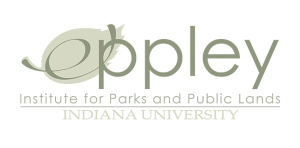
Eppley Institute and the U.S. Play Coalition hosted a Play Date mini conference at Bernheim Arboretum and Research Forest on August 11, part of a summer series for children’s play advocates, teachers, museum staffers, public librarians, architects, parks and recreation employees, and construction businesspeople.
The day started with a fun hike led by Carolyn Waters, Eppley Institute research associate and senior program manager, through wildflower prairieland, a listening sculpture, and holly forest, and past Little Nis, a giant sculpture made of wood shingles sitting at the edge of a lake. A very meditative way to begin the wild side of play.
Stephanie Garst, executive director of the U.S. Play Coalition, opened the event by recalling something she said in 2014 “In my world, play is survival.” She noted that after the pandemic, she’s come to realize “Play is survival. Play is how we stay connected.” Garst went on in introduce the keynote speaker who focused on the wild side of nature and nature.
“Unstructured play builds imagination, creativity, and healing,” said Tracey Gaslin, CEO of Alliance for Camp Health. “It’s not about having the perfect teepee. It’s about the effort. And unstructured play in a natural setting doubles the impact.”
Other sessions focused on creating your own natural playground, with tips from Matt Spalding., the director of stewardship at Olmsted Parks Conservatory in Louisville. In the first natural playground, the parks department built it on a $10,000 grant, and the second with a $15,000 grant. Spalding showed how gathering natural materials, like storm-felled trees and limestone boulders from building sites, can create wonderful structures for climbing over, under, and around. He fired up the chainsaw to demonstrate cutting a log for use in Bernheim’s newest playground project, which volunteers rolled into place.
“All wood is temporary and will need to be replaced,” Spalding said. “Remember replacement in your design plans.”
In an afternoon session on making playgrounds more accessible, three occupational therapists discuss how they work. “All children should have the opportunity to exist in these spaces and play,” Bri Marr, a graduate student in occupational therapy who worked at Bernheim.
Added Emily Moscoe, executive director of Outside the Box Therapies, “It’s not just being accepted, but feeling value and welcome.” With one out of every six children in the U.S. presenting a disability, the need for adaptive play spaces is critical.
Moscoe and Danielle Tosti, an occupational therapist specializing in sensory processing disorders and autism, said that it helps to provide places for kids to escape if they are sensitive to odors like car exhaust or farm animals, or providing tools such as shovels and hand washing stations for kids who have tactile sensistivies. Modeling awareness also helps, such as saying, “Oh, that makes my tummy feel bad” when smelling a heavy odor.
“Let’s move beyond the one accessible paved trail,“ said Marr.
After reviewing Bernheim’s 2-acre natural playground filled with logs both upright and on the ground, made for crawling or walking on, various sand pits and bridges, the group showed where the expansion of the natural area is taking place over another 17 acres. There will be a wheelchair course, water features that kids can play in, and over/under limestone boulders, among other amenities.
Claude Stephens, director of Children at Play Network at Bernheim Arboretum and Research Forest, wrapped up the event in the plenary session to help attendees figure out how to expand play networks regionally. “Our mission is to connect people with nature,” Stephens said. And one way that really worked for Bernheim was to build a family-friendly, welcoming ‘natural’ playground with debarked trees kids could grab and jump from one to another or play in rocks and sand. “If everything always looks the same way, it’s vulnerable. The same landscape, the same crops, the same playgrounds. Diversity is hopeful, the landscape of play included,” he said.
The Play Date ended with another hike and a chance to enjoy food truck fare, more networking, and perhaps a balancing walk across a log.
The next Play Date is on Monday, October 9 in Fort Worth, Texas, and the final one on November 9, will be virtual. For more information, visit https://usplaycoalition.org/2023-play-date-tour.